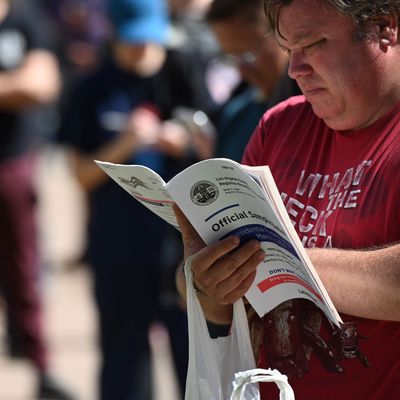
Thanks to the state’s enormous size and relatively easy rules for getting onto the ballot (via either legislation or voter petitions), California’s ballot initiatives have in the past served as something of a barometer for future trends in policy development and public opinion. That was particularly true for conservatives back in the day: Past ballot initiatives restricting property-tax increases (Proposition 13 in 1978), restricting public services for undocumented immigrants (Proposition 187 in 1994), imposing mandatory “three strikes” sentencing for repeat offenders (Proposition 184 in 1994), and banning affirmative action in university admissions and public employment (Proposition 209 in 1996) were all national landmarks in right-wing policy-making at the ballot box.
In more recent years, the state’s growing diversity has produced Democratic dominance in what was once a Republican-leading swing state. (California went Republican in nine of ten presidential contests from 1952 through 1988 but has gone Democratic in the seven contests since by steadily increasing margins — up to 30 percent in 2016.) So Democratic legislators and liberal interest and advocacy groups have grown more aggressive in reversing and eroding old conservative ballot measures and introducing their own.
Until COVID-19, its economic dislocations, the rampant wildfires, and terrible weather made 2020 truly a Year of Hell for the Golden State, it was expected to be a banner year for progressive ballot initiatives. Public-sector unions and local-government advocates had waited years for the right moment to strip commercial real estate of the Prop 13 protections against property-tax increases (freezing assessments and limiting rate hikes) for property held by the same owner and their heirs, which are a huge and continuing drain on revenues. At one point, this “split roll” initiative (Proposition 15) was expected to blot out the sky, overshadowing the presidential election. Now it’s more of a sideshow, though a very important one, mostly pitting labor against business groups, both of which are spending freely on ads.
A new PPIC survey just released shows “yes” opinions on Prop 15 are currently leading among likely voters by a modest 51/40 margin. Predictably, this initiative is characterized by partisan polarization: Democrats support it by a 72/20 margin, while Republicans oppose it by a 72/17 margin with independents split right down the middle (46/46). The “no” campaign is incessantly focused on the message that it’s the wrong time to hit businesses with higher taxes (although Proposition 15 exempts properties owned by small businesses), and the initiative will be a good test of the theory that voters grow more cautious under emergency conditions.
Another major initiative that involves once-fortuitous timing is Proposition 16, which would repeal the 1996 initiative (Prop 209) banning affirmative action in university admissions and state contracting and employment. This initiative was placed on the ballot by the state legislature and marks the gradual development of support among Asian American legislators and other opinion leaders — a real bastion of Democratic opposition to what has been perceived as higher-education quotas. The advent of powerful nationwide and statewide racial-justice protests is regarded as another auspicious sign.
But according to the PPIC, Proposition 16 isn’t doing well, with 31 percent of likely voters saying they’ll vote yes and 47 percent indicating they’ll vote no. Only 46 percent of Democrats support it, and indies oppose it 58/26. Crosstabs indicates that Latinos and nonwhite “others” (a catchall category that includes Blacks, Asian Americans, and Native Americans) are leaning toward no, and Prop 16 is losing in the very liberal San Francisco area 30/44.
There’s no current polling on another progressive initiative to abolish cash bail (Proposition 25), but the movement to do so has attracted hostile attention from Donald Trump. Proposition 25 and a conservative-sponsored initiative, Proposition 20 (reclassifying certain misdemeanor property crimes as felonies), will provide a good test of whether jitters about crime have significantly spread to California.
You may think the policy-heavy initiatives would attract the greatest investment of money, but, as is often the case in the state, narrower special-interest concerns are dominating the money chase and the airwaves. As in 2018, huge sums are being spent against an initiative (Proposition 23) to limit the profits of dialysis companies that is basically a conflict between one union and two companies. And the biggest-money item of all is Proposition 22, an industry-sponsored effort to exempt gig workers from a new state law reclassifying many “independent contractors” as employees with benefits. Thanks to heavy backing from Uber, Lyft, Instacart, and DoorDash, an incredible $182 million has been raised so far to promote this initiative (and only $9 million to defeat it).
It will be fascinating to see if any of these causes break through the wild news and the chaos of candidate-centered campaigns and move public opinion. It’s possible a sort of sour public mood will inspire a lot of otherwise surprising “no” votes on initiatives. In the March California primary, many eyebrows were raised when a statewide school-bond initiative went down in defeat, and that was before the coronavirus fully hit. Turnout is another imponderable. Much to the president’s fury, California is sending mail-in ballots to all active registered voters for this general election (72 percent of the votes in the 2020 primary were cast by mail when voters had a choice). Historically, the increased use of mail ballots has boosted overall turnout, but that’s not true for young voters and some minority groups.
As with so many aspects of this election, we may not know the results of California’s voting on ballot initiatives until some days after November 3, and many of us fear the country will be locked into a disputed presidential election by then. So these footnotes to a tumultuous year may lie in the ashes until their full import sinks in at some quieter juncture down the road.






























